An Analysis of Banking and Finance Law: Money Laundering in the UK
VerifiedAdded on 2022/08/20
|19
|4511
|14
Report
AI Summary
This report delves into the realm of banking and finance law, specifically focusing on the issue of money laundering in the United Kingdom. It commences by defining financial crime and money laundering, highlighting the three-step process involved in the latter. The report then transitions into a detailed analysis of the legal framework designed to combat money laundering, including the Terrorist Act 2000, the Proceeds of Crime Act 2002, and the Sanctions and Anti-Money Laundering Act 2018. It explores the effects of the Proceeds of Crime Act 2002 in preventing money laundering, the defenses available to those accused of money laundering offenses, and the sentencing guidelines established for such crimes. The report also examines the impact of the Sanctions and Anti-Money Laundering Act 2018 and the Serious Crimes Act 2015. The discussion covers the powers conferred by these acts, their effectiveness, and any identified loopholes. Overall, the report offers a comprehensive overview of the legal landscape surrounding money laundering in the UK and its implications.
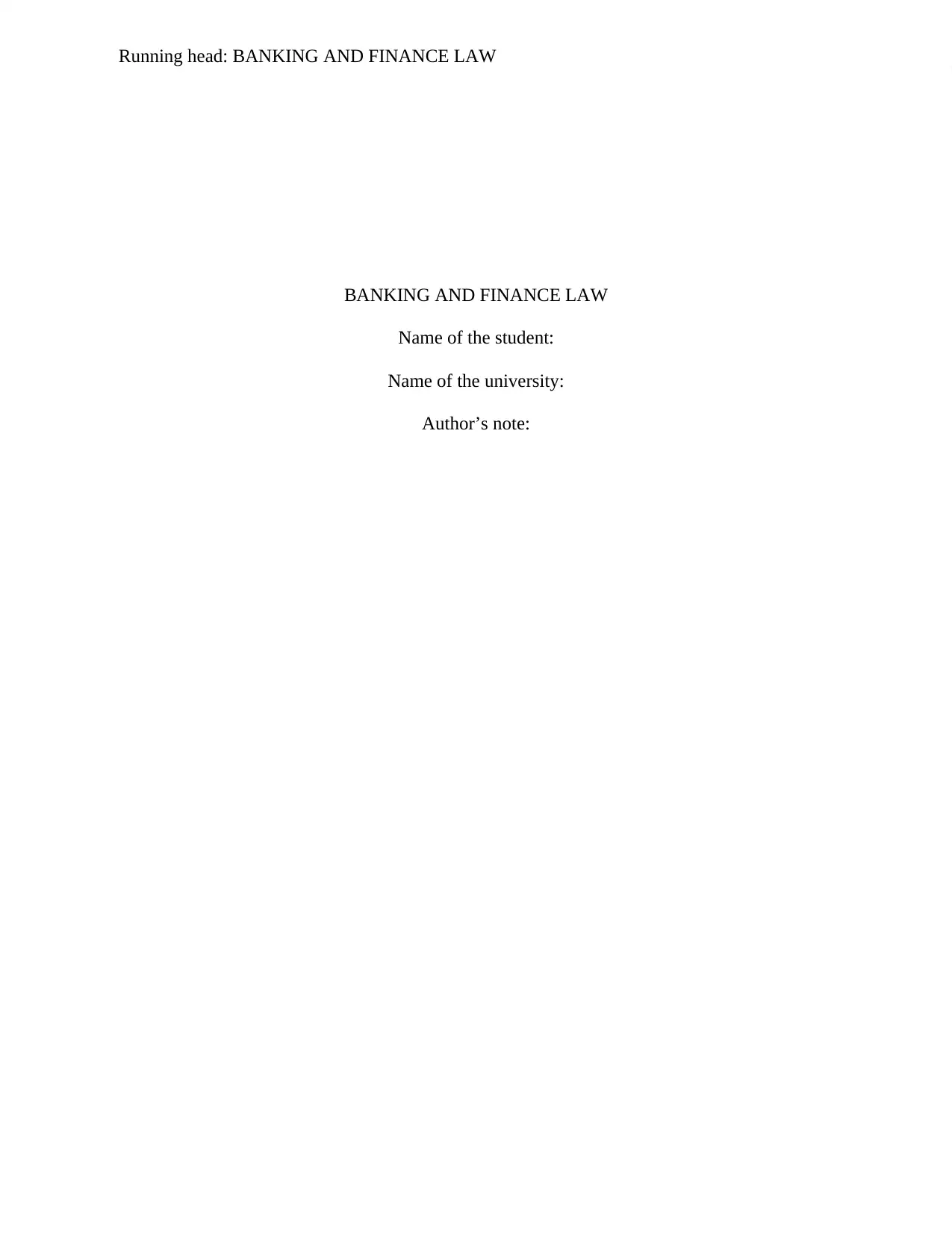
Running head: BANKING AND FINANCE LAW
0
BANKING AND FINANCE LAW
Name of the student:
Name of the university:
Author’s note:
0
BANKING AND FINANCE LAW
Name of the student:
Name of the university:
Author’s note:
Paraphrase This Document
Need a fresh take? Get an instant paraphrase of this document with our AI Paraphraser
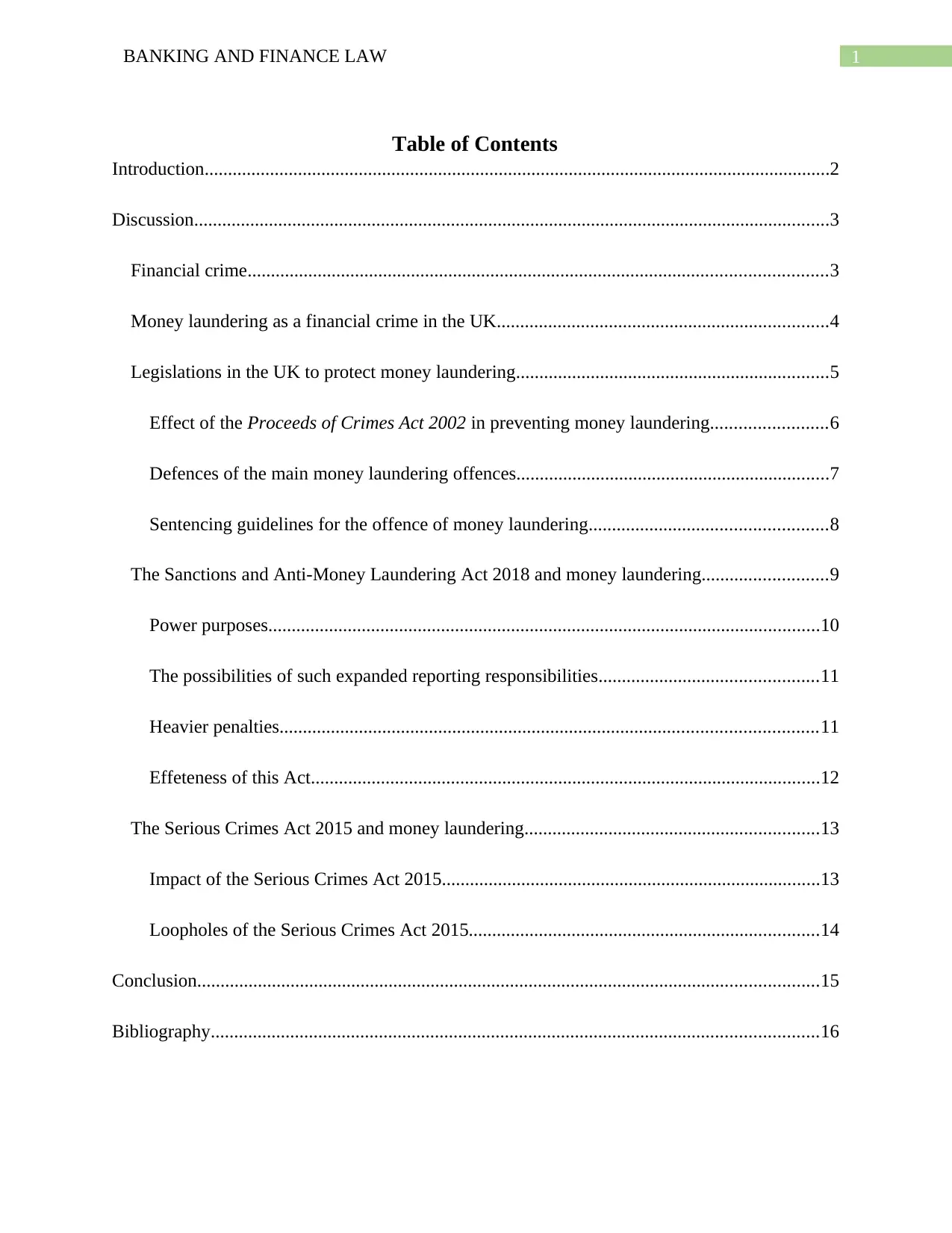
1BANKING AND FINANCE LAW
Table of Contents
Introduction......................................................................................................................................2
Discussion........................................................................................................................................3
Financial crime............................................................................................................................3
Money laundering as a financial crime in the UK.......................................................................4
Legislations in the UK to protect money laundering...................................................................5
Effect of the Proceeds of Crimes Act 2002 in preventing money laundering.........................6
Defences of the main money laundering offences...................................................................7
Sentencing guidelines for the offence of money laundering...................................................8
The Sanctions and Anti-Money Laundering Act 2018 and money laundering...........................9
Power purposes......................................................................................................................10
The possibilities of such expanded reporting responsibilities...............................................11
Heavier penalties...................................................................................................................11
Effeteness of this Act.............................................................................................................12
The Serious Crimes Act 2015 and money laundering...............................................................13
Impact of the Serious Crimes Act 2015.................................................................................13
Loopholes of the Serious Crimes Act 2015...........................................................................14
Conclusion.....................................................................................................................................15
Bibliography..................................................................................................................................16
Table of Contents
Introduction......................................................................................................................................2
Discussion........................................................................................................................................3
Financial crime............................................................................................................................3
Money laundering as a financial crime in the UK.......................................................................4
Legislations in the UK to protect money laundering...................................................................5
Effect of the Proceeds of Crimes Act 2002 in preventing money laundering.........................6
Defences of the main money laundering offences...................................................................7
Sentencing guidelines for the offence of money laundering...................................................8
The Sanctions and Anti-Money Laundering Act 2018 and money laundering...........................9
Power purposes......................................................................................................................10
The possibilities of such expanded reporting responsibilities...............................................11
Heavier penalties...................................................................................................................11
Effeteness of this Act.............................................................................................................12
The Serious Crimes Act 2015 and money laundering...............................................................13
Impact of the Serious Crimes Act 2015.................................................................................13
Loopholes of the Serious Crimes Act 2015...........................................................................14
Conclusion.....................................................................................................................................15
Bibliography..................................................................................................................................16
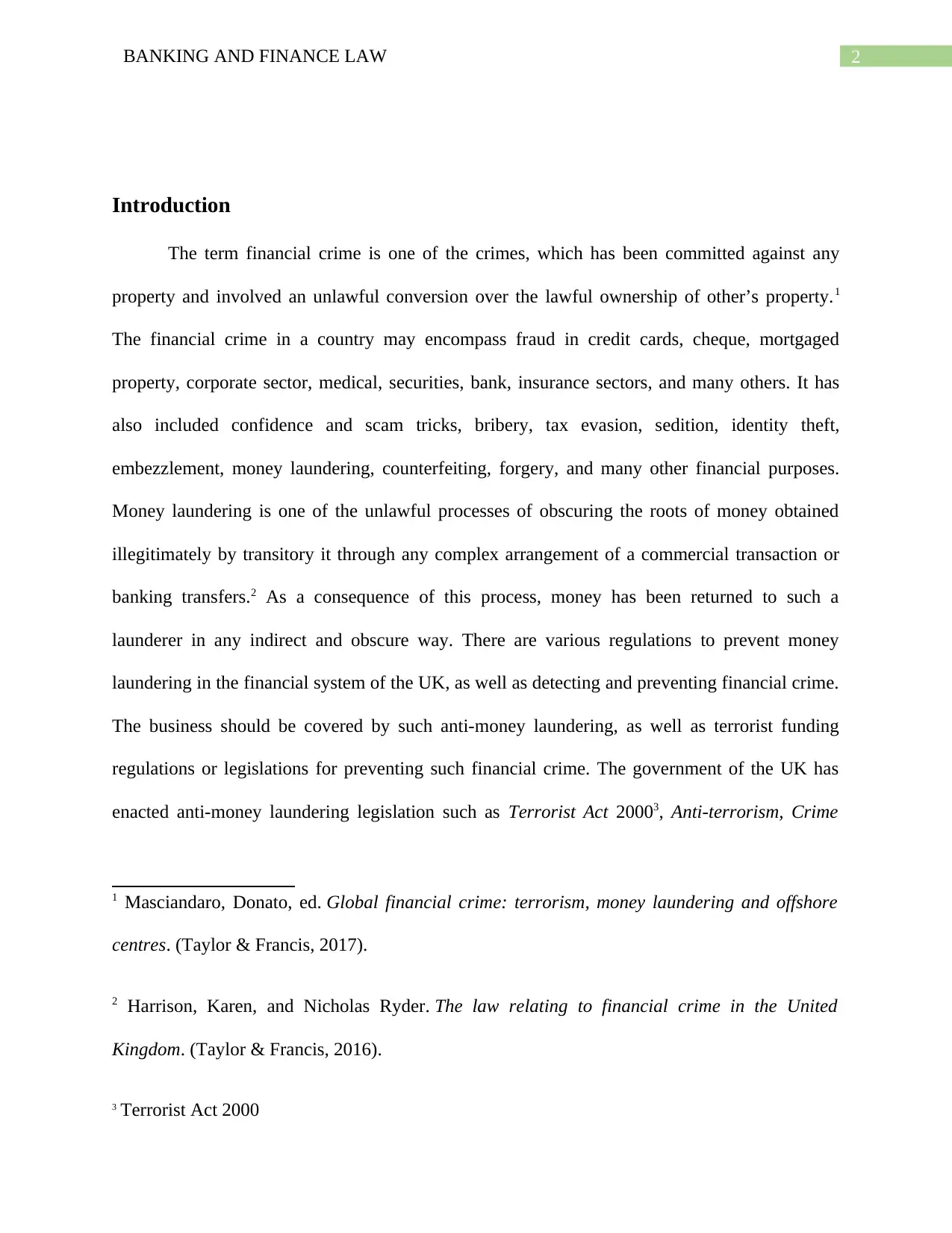
2BANKING AND FINANCE LAW
Introduction
The term financial crime is one of the crimes, which has been committed against any
property and involved an unlawful conversion over the lawful ownership of other’s property.1
The financial crime in a country may encompass fraud in credit cards, cheque, mortgaged
property, corporate sector, medical, securities, bank, insurance sectors, and many others. It has
also included confidence and scam tricks, bribery, tax evasion, sedition, identity theft,
embezzlement, money laundering, counterfeiting, forgery, and many other financial purposes.
Money laundering is one of the unlawful processes of obscuring the roots of money obtained
illegitimately by transitory it through any complex arrangement of a commercial transaction or
banking transfers.2 As a consequence of this process, money has been returned to such a
launderer in any indirect and obscure way. There are various regulations to prevent money
laundering in the financial system of the UK, as well as detecting and preventing financial crime.
The business should be covered by such anti-money laundering, as well as terrorist funding
regulations or legislations for preventing such financial crime. The government of the UK has
enacted anti-money laundering legislation such as Terrorist Act 20003, Anti-terrorism, Crime
1 Masciandaro, Donato, ed. Global financial crime: terrorism, money laundering and offshore
centres. (Taylor & Francis, 2017).
2 Harrison, Karen, and Nicholas Ryder. The law relating to financial crime in the United
Kingdom. (Taylor & Francis, 2016).
3 Terrorist Act 2000
Introduction
The term financial crime is one of the crimes, which has been committed against any
property and involved an unlawful conversion over the lawful ownership of other’s property.1
The financial crime in a country may encompass fraud in credit cards, cheque, mortgaged
property, corporate sector, medical, securities, bank, insurance sectors, and many others. It has
also included confidence and scam tricks, bribery, tax evasion, sedition, identity theft,
embezzlement, money laundering, counterfeiting, forgery, and many other financial purposes.
Money laundering is one of the unlawful processes of obscuring the roots of money obtained
illegitimately by transitory it through any complex arrangement of a commercial transaction or
banking transfers.2 As a consequence of this process, money has been returned to such a
launderer in any indirect and obscure way. There are various regulations to prevent money
laundering in the financial system of the UK, as well as detecting and preventing financial crime.
The business should be covered by such anti-money laundering, as well as terrorist funding
regulations or legislations for preventing such financial crime. The government of the UK has
enacted anti-money laundering legislation such as Terrorist Act 20003, Anti-terrorism, Crime
1 Masciandaro, Donato, ed. Global financial crime: terrorism, money laundering and offshore
centres. (Taylor & Francis, 2017).
2 Harrison, Karen, and Nicholas Ryder. The law relating to financial crime in the United
Kingdom. (Taylor & Francis, 2016).
3 Terrorist Act 2000
⊘ This is a preview!⊘
Do you want full access?
Subscribe today to unlock all pages.

Trusted by 1+ million students worldwide
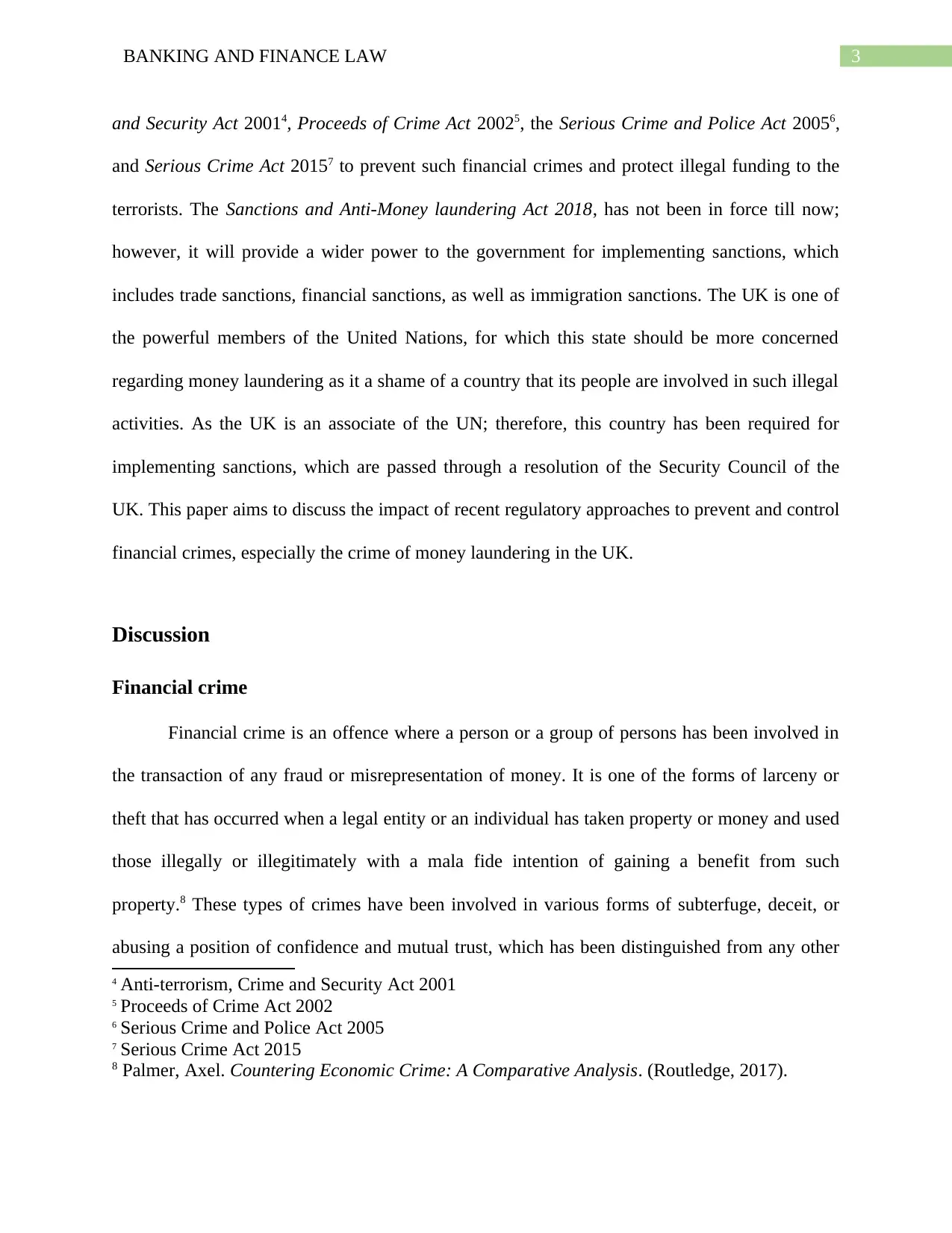
3BANKING AND FINANCE LAW
and Security Act 20014, Proceeds of Crime Act 20025, the Serious Crime and Police Act 20056,
and Serious Crime Act 20157 to prevent such financial crimes and protect illegal funding to the
terrorists. The Sanctions and Anti-Money laundering Act 2018, has not been in force till now;
however, it will provide a wider power to the government for implementing sanctions, which
includes trade sanctions, financial sanctions, as well as immigration sanctions. The UK is one of
the powerful members of the United Nations, for which this state should be more concerned
regarding money laundering as it a shame of a country that its people are involved in such illegal
activities. As the UK is an associate of the UN; therefore, this country has been required for
implementing sanctions, which are passed through a resolution of the Security Council of the
UK. This paper aims to discuss the impact of recent regulatory approaches to prevent and control
financial crimes, especially the crime of money laundering in the UK.
Discussion
Financial crime
Financial crime is an offence where a person or a group of persons has been involved in
the transaction of any fraud or misrepresentation of money. It is one of the forms of larceny or
theft that has occurred when a legal entity or an individual has taken property or money and used
those illegally or illegitimately with a mala fide intention of gaining a benefit from such
property.8 These types of crimes have been involved in various forms of subterfuge, deceit, or
abusing a position of confidence and mutual trust, which has been distinguished from any other
4 Anti-terrorism, Crime and Security Act 2001
5 Proceeds of Crime Act 2002
6 Serious Crime and Police Act 2005
7 Serious Crime Act 2015
8 Palmer, Axel. Countering Economic Crime: A Comparative Analysis. (Routledge, 2017).
and Security Act 20014, Proceeds of Crime Act 20025, the Serious Crime and Police Act 20056,
and Serious Crime Act 20157 to prevent such financial crimes and protect illegal funding to the
terrorists. The Sanctions and Anti-Money laundering Act 2018, has not been in force till now;
however, it will provide a wider power to the government for implementing sanctions, which
includes trade sanctions, financial sanctions, as well as immigration sanctions. The UK is one of
the powerful members of the United Nations, for which this state should be more concerned
regarding money laundering as it a shame of a country that its people are involved in such illegal
activities. As the UK is an associate of the UN; therefore, this country has been required for
implementing sanctions, which are passed through a resolution of the Security Council of the
UK. This paper aims to discuss the impact of recent regulatory approaches to prevent and control
financial crimes, especially the crime of money laundering in the UK.
Discussion
Financial crime
Financial crime is an offence where a person or a group of persons has been involved in
the transaction of any fraud or misrepresentation of money. It is one of the forms of larceny or
theft that has occurred when a legal entity or an individual has taken property or money and used
those illegally or illegitimately with a mala fide intention of gaining a benefit from such
property.8 These types of crimes have been involved in various forms of subterfuge, deceit, or
abusing a position of confidence and mutual trust, which has been distinguished from any other
4 Anti-terrorism, Crime and Security Act 2001
5 Proceeds of Crime Act 2002
6 Serious Crime and Police Act 2005
7 Serious Crime Act 2015
8 Palmer, Axel. Countering Economic Crime: A Comparative Analysis. (Routledge, 2017).
Paraphrase This Document
Need a fresh take? Get an instant paraphrase of this document with our AI Paraphraser
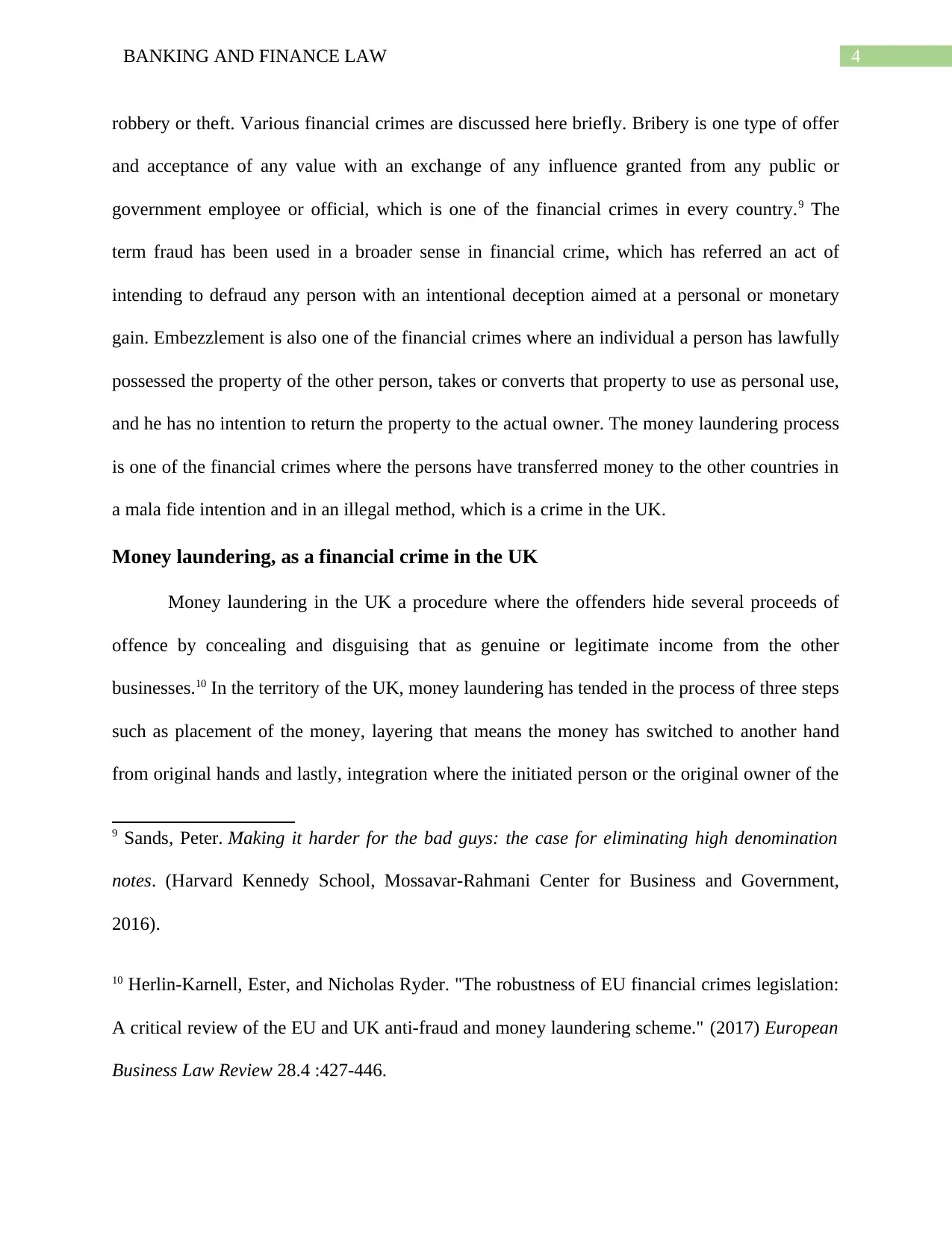
4BANKING AND FINANCE LAW
robbery or theft. Various financial crimes are discussed here briefly. Bribery is one type of offer
and acceptance of any value with an exchange of any influence granted from any public or
government employee or official, which is one of the financial crimes in every country.9 The
term fraud has been used in a broader sense in financial crime, which has referred an act of
intending to defraud any person with an intentional deception aimed at a personal or monetary
gain. Embezzlement is also one of the financial crimes where an individual a person has lawfully
possessed the property of the other person, takes or converts that property to use as personal use,
and he has no intention to return the property to the actual owner. The money laundering process
is one of the financial crimes where the persons have transferred money to the other countries in
a mala fide intention and in an illegal method, which is a crime in the UK.
Money laundering, as a financial crime in the UK
Money laundering in the UK a procedure where the offenders hide several proceeds of
offence by concealing and disguising that as genuine or legitimate income from the other
businesses.10 In the territory of the UK, money laundering has tended in the process of three steps
such as placement of the money, layering that means the money has switched to another hand
from original hands and lastly, integration where the initiated person or the original owner of the
9 Sands, Peter. Making it harder for the bad guys: the case for eliminating high denomination
notes. (Harvard Kennedy School, Mossavar-Rahmani Center for Business and Government,
2016).
10 Herlin-Karnell, Ester, and Nicholas Ryder. "The robustness of EU financial crimes legislation:
A critical review of the EU and UK anti-fraud and money laundering scheme." (2017) European
Business Law Review 28.4 :427-446.
robbery or theft. Various financial crimes are discussed here briefly. Bribery is one type of offer
and acceptance of any value with an exchange of any influence granted from any public or
government employee or official, which is one of the financial crimes in every country.9 The
term fraud has been used in a broader sense in financial crime, which has referred an act of
intending to defraud any person with an intentional deception aimed at a personal or monetary
gain. Embezzlement is also one of the financial crimes where an individual a person has lawfully
possessed the property of the other person, takes or converts that property to use as personal use,
and he has no intention to return the property to the actual owner. The money laundering process
is one of the financial crimes where the persons have transferred money to the other countries in
a mala fide intention and in an illegal method, which is a crime in the UK.
Money laundering, as a financial crime in the UK
Money laundering in the UK a procedure where the offenders hide several proceeds of
offence by concealing and disguising that as genuine or legitimate income from the other
businesses.10 In the territory of the UK, money laundering has tended in the process of three steps
such as placement of the money, layering that means the money has switched to another hand
from original hands and lastly, integration where the initiated person or the original owner of the
9 Sands, Peter. Making it harder for the bad guys: the case for eliminating high denomination
notes. (Harvard Kennedy School, Mossavar-Rahmani Center for Business and Government,
2016).
10 Herlin-Karnell, Ester, and Nicholas Ryder. "The robustness of EU financial crimes legislation:
A critical review of the EU and UK anti-fraud and money laundering scheme." (2017) European
Business Law Review 28.4 :427-446.
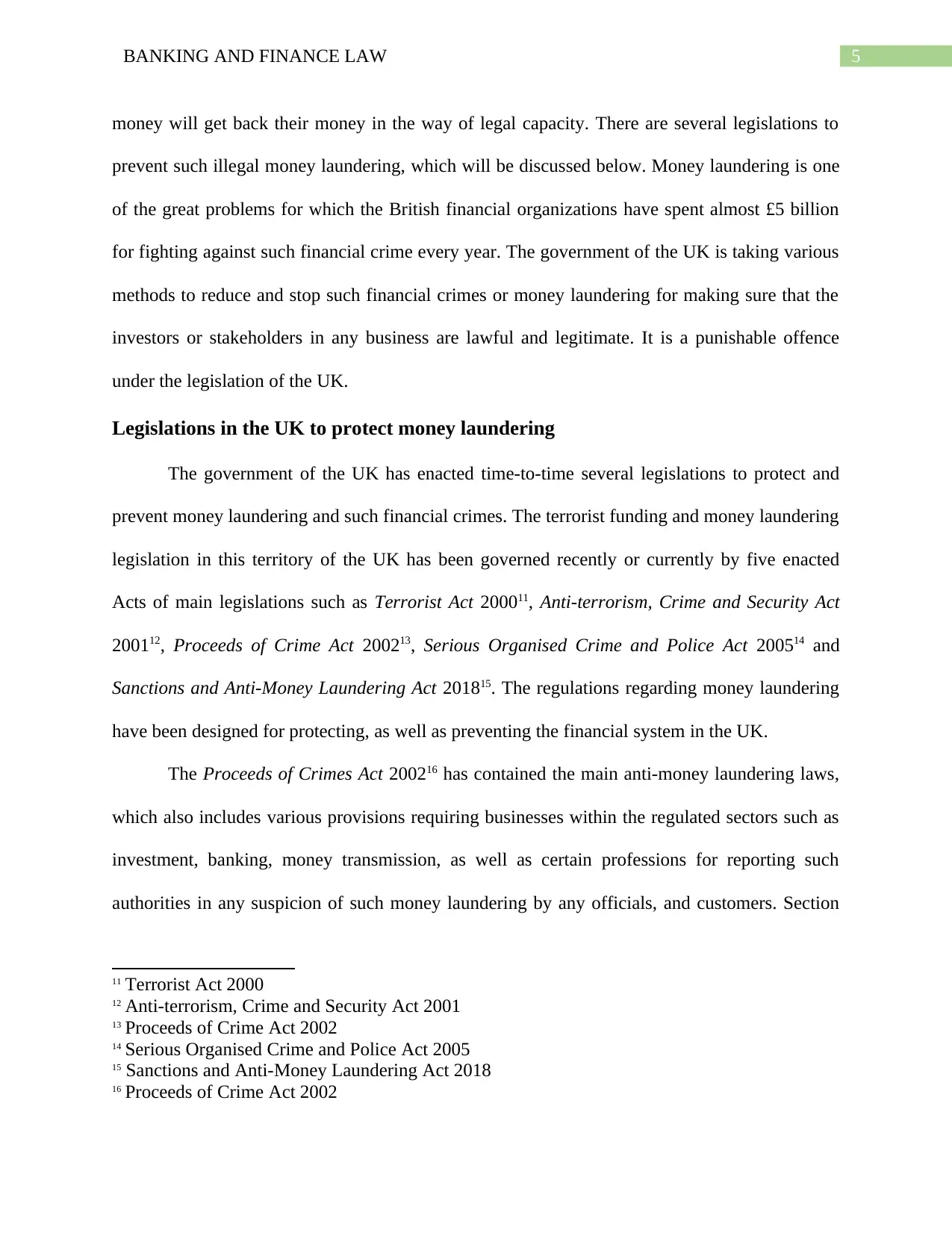
5BANKING AND FINANCE LAW
money will get back their money in the way of legal capacity. There are several legislations to
prevent such illegal money laundering, which will be discussed below. Money laundering is one
of the great problems for which the British financial organizations have spent almost £5 billion
for fighting against such financial crime every year. The government of the UK is taking various
methods to reduce and stop such financial crimes or money laundering for making sure that the
investors or stakeholders in any business are lawful and legitimate. It is a punishable offence
under the legislation of the UK.
Legislations in the UK to protect money laundering
The government of the UK has enacted time-to-time several legislations to protect and
prevent money laundering and such financial crimes. The terrorist funding and money laundering
legislation in this territory of the UK has been governed recently or currently by five enacted
Acts of main legislations such as Terrorist Act 200011, Anti-terrorism, Crime and Security Act
200112, Proceeds of Crime Act 200213, Serious Organised Crime and Police Act 200514 and
Sanctions and Anti-Money Laundering Act 201815. The regulations regarding money laundering
have been designed for protecting, as well as preventing the financial system in the UK.
The Proceeds of Crimes Act 200216 has contained the main anti-money laundering laws,
which also includes various provisions requiring businesses within the regulated sectors such as
investment, banking, money transmission, as well as certain professions for reporting such
authorities in any suspicion of such money laundering by any officials, and customers. Section
11 Terrorist Act 2000
12 Anti-terrorism, Crime and Security Act 2001
13 Proceeds of Crime Act 2002
14 Serious Organised Crime and Police Act 2005
15 Sanctions and Anti-Money Laundering Act 2018
16 Proceeds of Crime Act 2002
money will get back their money in the way of legal capacity. There are several legislations to
prevent such illegal money laundering, which will be discussed below. Money laundering is one
of the great problems for which the British financial organizations have spent almost £5 billion
for fighting against such financial crime every year. The government of the UK is taking various
methods to reduce and stop such financial crimes or money laundering for making sure that the
investors or stakeholders in any business are lawful and legitimate. It is a punishable offence
under the legislation of the UK.
Legislations in the UK to protect money laundering
The government of the UK has enacted time-to-time several legislations to protect and
prevent money laundering and such financial crimes. The terrorist funding and money laundering
legislation in this territory of the UK has been governed recently or currently by five enacted
Acts of main legislations such as Terrorist Act 200011, Anti-terrorism, Crime and Security Act
200112, Proceeds of Crime Act 200213, Serious Organised Crime and Police Act 200514 and
Sanctions and Anti-Money Laundering Act 201815. The regulations regarding money laundering
have been designed for protecting, as well as preventing the financial system in the UK.
The Proceeds of Crimes Act 200216 has contained the main anti-money laundering laws,
which also includes various provisions requiring businesses within the regulated sectors such as
investment, banking, money transmission, as well as certain professions for reporting such
authorities in any suspicion of such money laundering by any officials, and customers. Section
11 Terrorist Act 2000
12 Anti-terrorism, Crime and Security Act 2001
13 Proceeds of Crime Act 2002
14 Serious Organised Crime and Police Act 2005
15 Sanctions and Anti-Money Laundering Act 2018
16 Proceeds of Crime Act 2002
⊘ This is a preview!⊘
Do you want full access?
Subscribe today to unlock all pages.

Trusted by 1+ million students worldwide
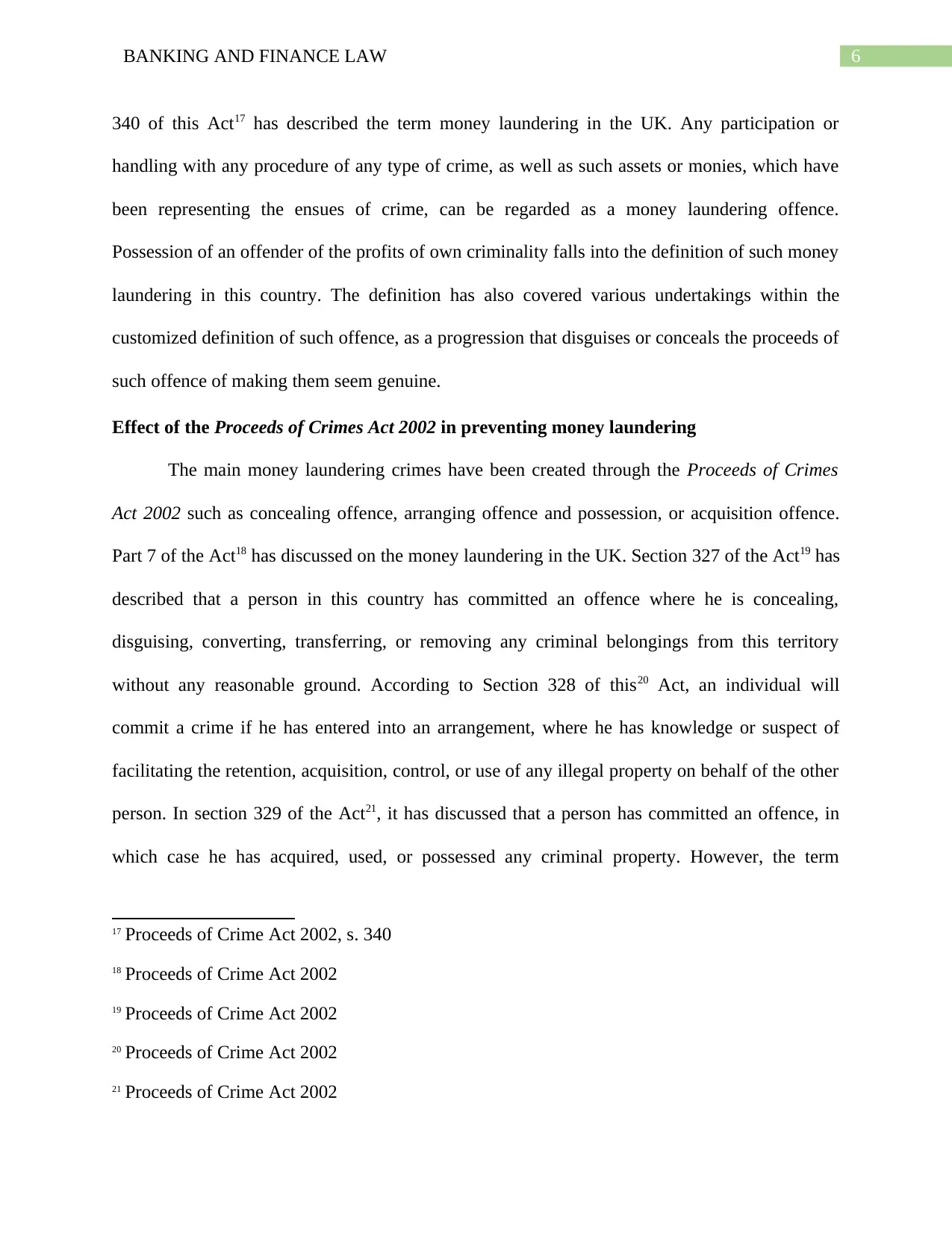
6BANKING AND FINANCE LAW
340 of this Act17 has described the term money laundering in the UK. Any participation or
handling with any procedure of any type of crime, as well as such assets or monies, which have
been representing the ensues of crime, can be regarded as a money laundering offence.
Possession of an offender of the profits of own criminality falls into the definition of such money
laundering in this country. The definition has also covered various undertakings within the
customized definition of such offence, as a progression that disguises or conceals the proceeds of
such offence of making them seem genuine.
Effect of the Proceeds of Crimes Act 2002 in preventing money laundering
The main money laundering crimes have been created through the Proceeds of Crimes
Act 2002 such as concealing offence, arranging offence and possession, or acquisition offence.
Part 7 of the Act18 has discussed on the money laundering in the UK. Section 327 of the Act19 has
described that a person in this country has committed an offence where he is concealing,
disguising, converting, transferring, or removing any criminal belongings from this territory
without any reasonable ground. According to Section 328 of this20 Act, an individual will
commit a crime if he has entered into an arrangement, where he has knowledge or suspect of
facilitating the retention, acquisition, control, or use of any illegal property on behalf of the other
person. In section 329 of the Act21, it has discussed that a person has committed an offence, in
which case he has acquired, used, or possessed any criminal property. However, the term
17 Proceeds of Crime Act 2002, s. 340
18 Proceeds of Crime Act 2002
19 Proceeds of Crime Act 2002
20 Proceeds of Crime Act 2002
21 Proceeds of Crime Act 2002
340 of this Act17 has described the term money laundering in the UK. Any participation or
handling with any procedure of any type of crime, as well as such assets or monies, which have
been representing the ensues of crime, can be regarded as a money laundering offence.
Possession of an offender of the profits of own criminality falls into the definition of such money
laundering in this country. The definition has also covered various undertakings within the
customized definition of such offence, as a progression that disguises or conceals the proceeds of
such offence of making them seem genuine.
Effect of the Proceeds of Crimes Act 2002 in preventing money laundering
The main money laundering crimes have been created through the Proceeds of Crimes
Act 2002 such as concealing offence, arranging offence and possession, or acquisition offence.
Part 7 of the Act18 has discussed on the money laundering in the UK. Section 327 of the Act19 has
described that a person in this country has committed an offence where he is concealing,
disguising, converting, transferring, or removing any criminal belongings from this territory
without any reasonable ground. According to Section 328 of this20 Act, an individual will
commit a crime if he has entered into an arrangement, where he has knowledge or suspect of
facilitating the retention, acquisition, control, or use of any illegal property on behalf of the other
person. In section 329 of the Act21, it has discussed that a person has committed an offence, in
which case he has acquired, used, or possessed any criminal property. However, the term
17 Proceeds of Crime Act 2002, s. 340
18 Proceeds of Crime Act 2002
19 Proceeds of Crime Act 2002
20 Proceeds of Crime Act 2002
21 Proceeds of Crime Act 2002
Paraphrase This Document
Need a fresh take? Get an instant paraphrase of this document with our AI Paraphraser
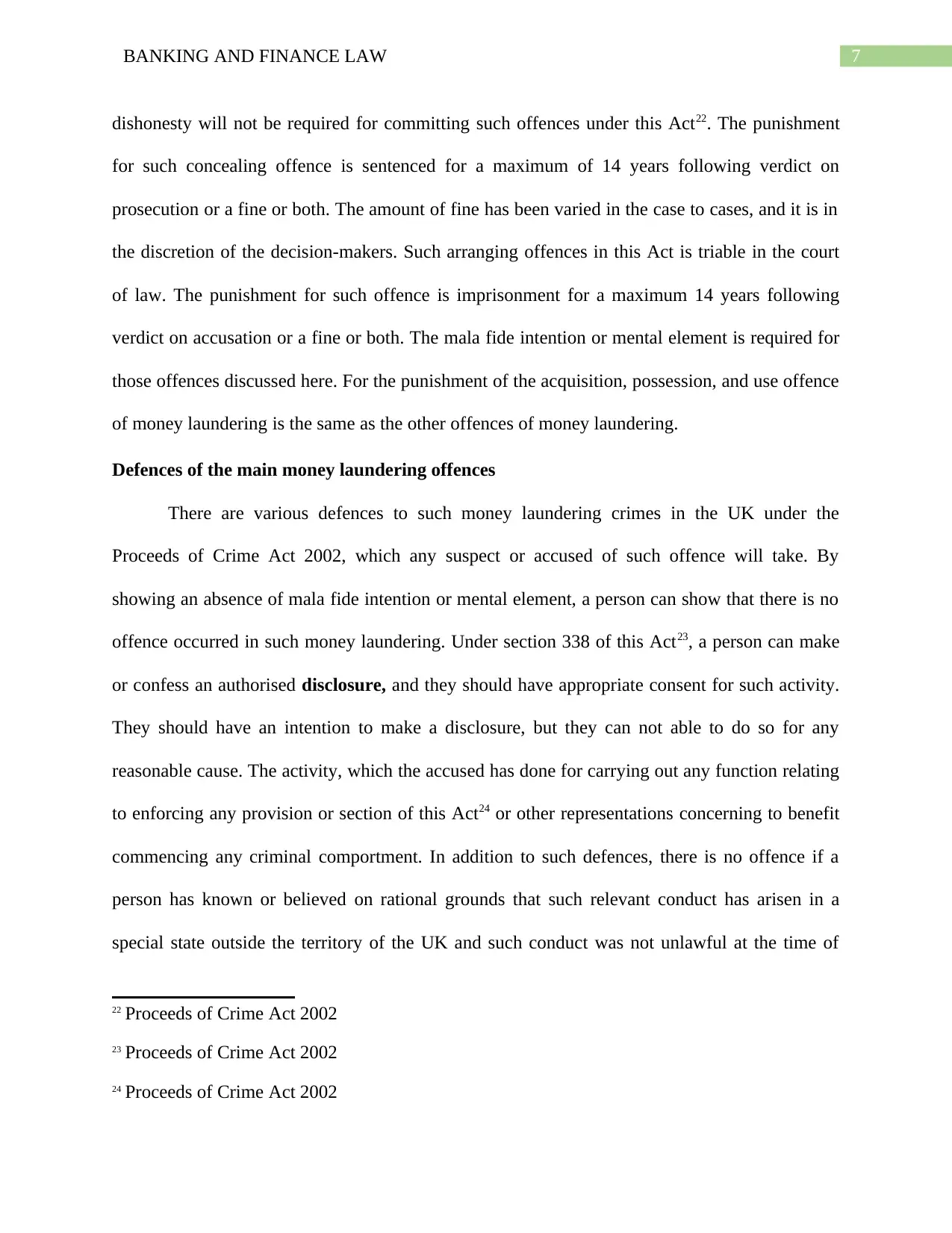
7BANKING AND FINANCE LAW
dishonesty will not be required for committing such offences under this Act22. The punishment
for such concealing offence is sentenced for a maximum of 14 years following verdict on
prosecution or a fine or both. The amount of fine has been varied in the case to cases, and it is in
the discretion of the decision-makers. Such arranging offences in this Act is triable in the court
of law. The punishment for such offence is imprisonment for a maximum 14 years following
verdict on accusation or a fine or both. The mala fide intention or mental element is required for
those offences discussed here. For the punishment of the acquisition, possession, and use offence
of money laundering is the same as the other offences of money laundering.
Defences of the main money laundering offences
There are various defences to such money laundering crimes in the UK under the
Proceeds of Crime Act 2002, which any suspect or accused of such offence will take. By
showing an absence of mala fide intention or mental element, a person can show that there is no
offence occurred in such money laundering. Under section 338 of this Act23, a person can make
or confess an authorised disclosure, and they should have appropriate consent for such activity.
They should have an intention to make a disclosure, but they can not able to do so for any
reasonable cause. The activity, which the accused has done for carrying out any function relating
to enforcing any provision or section of this Act24 or other representations concerning to benefit
commencing any criminal comportment. In addition to such defences, there is no offence if a
person has known or believed on rational grounds that such relevant conduct has arisen in a
special state outside the territory of the UK and such conduct was not unlawful at the time of
22 Proceeds of Crime Act 2002
23 Proceeds of Crime Act 2002
24 Proceeds of Crime Act 2002
dishonesty will not be required for committing such offences under this Act22. The punishment
for such concealing offence is sentenced for a maximum of 14 years following verdict on
prosecution or a fine or both. The amount of fine has been varied in the case to cases, and it is in
the discretion of the decision-makers. Such arranging offences in this Act is triable in the court
of law. The punishment for such offence is imprisonment for a maximum 14 years following
verdict on accusation or a fine or both. The mala fide intention or mental element is required for
those offences discussed here. For the punishment of the acquisition, possession, and use offence
of money laundering is the same as the other offences of money laundering.
Defences of the main money laundering offences
There are various defences to such money laundering crimes in the UK under the
Proceeds of Crime Act 2002, which any suspect or accused of such offence will take. By
showing an absence of mala fide intention or mental element, a person can show that there is no
offence occurred in such money laundering. Under section 338 of this Act23, a person can make
or confess an authorised disclosure, and they should have appropriate consent for such activity.
They should have an intention to make a disclosure, but they can not able to do so for any
reasonable cause. The activity, which the accused has done for carrying out any function relating
to enforcing any provision or section of this Act24 or other representations concerning to benefit
commencing any criminal comportment. In addition to such defences, there is no offence if a
person has known or believed on rational grounds that such relevant conduct has arisen in a
special state outside the territory of the UK and such conduct was not unlawful at the time of
22 Proceeds of Crime Act 2002
23 Proceeds of Crime Act 2002
24 Proceeds of Crime Act 2002
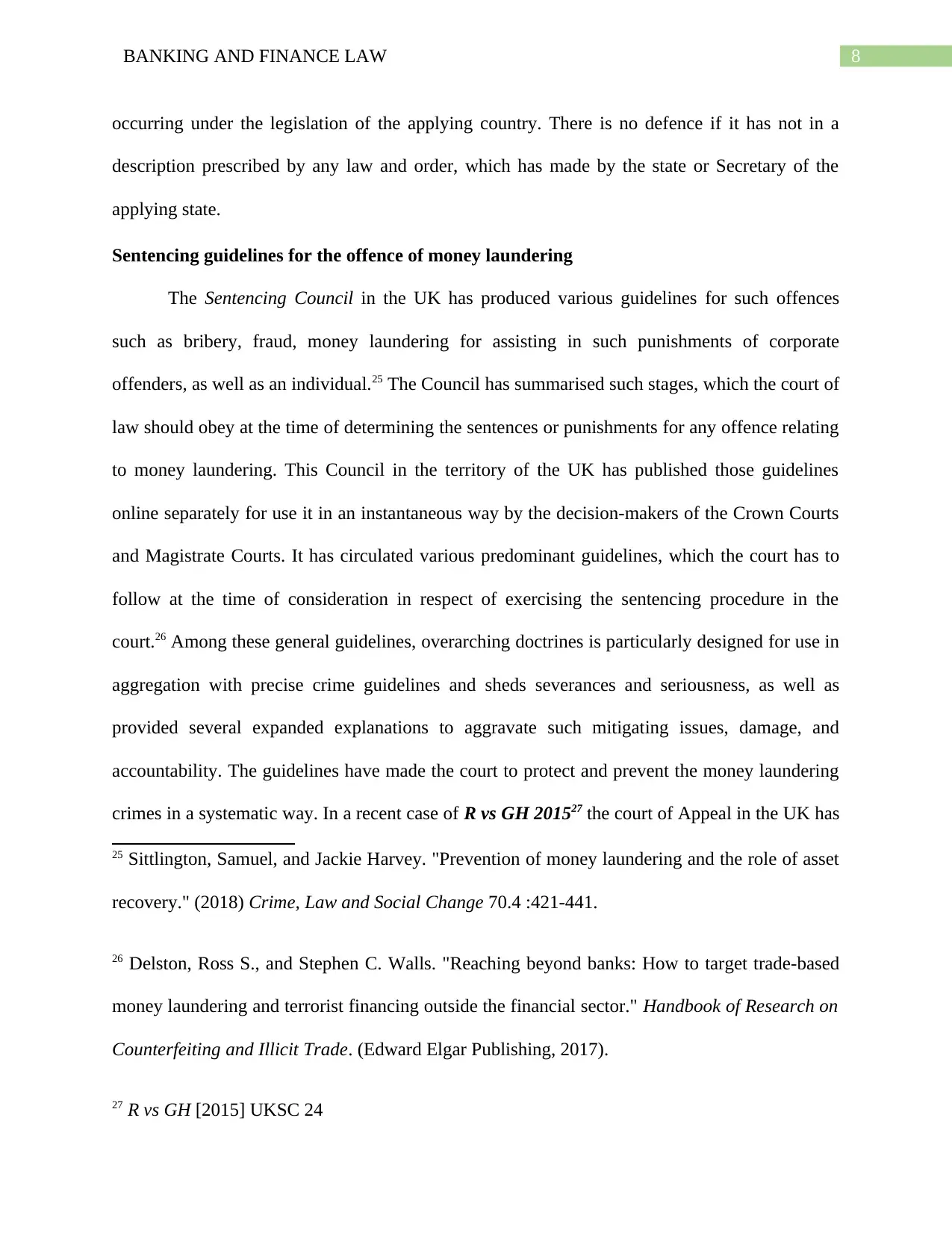
8BANKING AND FINANCE LAW
occurring under the legislation of the applying country. There is no defence if it has not in a
description prescribed by any law and order, which has made by the state or Secretary of the
applying state.
Sentencing guidelines for the offence of money laundering
The Sentencing Council in the UK has produced various guidelines for such offences
such as bribery, fraud, money laundering for assisting in such punishments of corporate
offenders, as well as an individual.25 The Council has summarised such stages, which the court of
law should obey at the time of determining the sentences or punishments for any offence relating
to money laundering. This Council in the territory of the UK has published those guidelines
online separately for use it in an instantaneous way by the decision-makers of the Crown Courts
and Magistrate Courts. It has circulated various predominant guidelines, which the court has to
follow at the time of consideration in respect of exercising the sentencing procedure in the
court.26 Among these general guidelines, overarching doctrines is particularly designed for use in
aggregation with precise crime guidelines and sheds severances and seriousness, as well as
provided several expanded explanations to aggravate such mitigating issues, damage, and
accountability. The guidelines have made the court to protect and prevent the money laundering
crimes in a systematic way. In a recent case of R vs GH 201527 the court of Appeal in the UK has
25 Sittlington, Samuel, and Jackie Harvey. "Prevention of money laundering and the role of asset
recovery." (2018) Crime, Law and Social Change 70.4 :421-441.
26 Delston, Ross S., and Stephen C. Walls. "Reaching beyond banks: How to target trade-based
money laundering and terrorist financing outside the financial sector." Handbook of Research on
Counterfeiting and Illicit Trade. (Edward Elgar Publishing, 2017).
27 R vs GH [2015] UKSC 24
occurring under the legislation of the applying country. There is no defence if it has not in a
description prescribed by any law and order, which has made by the state or Secretary of the
applying state.
Sentencing guidelines for the offence of money laundering
The Sentencing Council in the UK has produced various guidelines for such offences
such as bribery, fraud, money laundering for assisting in such punishments of corporate
offenders, as well as an individual.25 The Council has summarised such stages, which the court of
law should obey at the time of determining the sentences or punishments for any offence relating
to money laundering. This Council in the territory of the UK has published those guidelines
online separately for use it in an instantaneous way by the decision-makers of the Crown Courts
and Magistrate Courts. It has circulated various predominant guidelines, which the court has to
follow at the time of consideration in respect of exercising the sentencing procedure in the
court.26 Among these general guidelines, overarching doctrines is particularly designed for use in
aggregation with precise crime guidelines and sheds severances and seriousness, as well as
provided several expanded explanations to aggravate such mitigating issues, damage, and
accountability. The guidelines have made the court to protect and prevent the money laundering
crimes in a systematic way. In a recent case of R vs GH 201527 the court of Appeal in the UK has
25 Sittlington, Samuel, and Jackie Harvey. "Prevention of money laundering and the role of asset
recovery." (2018) Crime, Law and Social Change 70.4 :421-441.
26 Delston, Ross S., and Stephen C. Walls. "Reaching beyond banks: How to target trade-based
money laundering and terrorist financing outside the financial sector." Handbook of Research on
Counterfeiting and Illicit Trade. (Edward Elgar Publishing, 2017).
27 R vs GH [2015] UKSC 24
⊘ This is a preview!⊘
Do you want full access?
Subscribe today to unlock all pages.

Trusted by 1+ million students worldwide
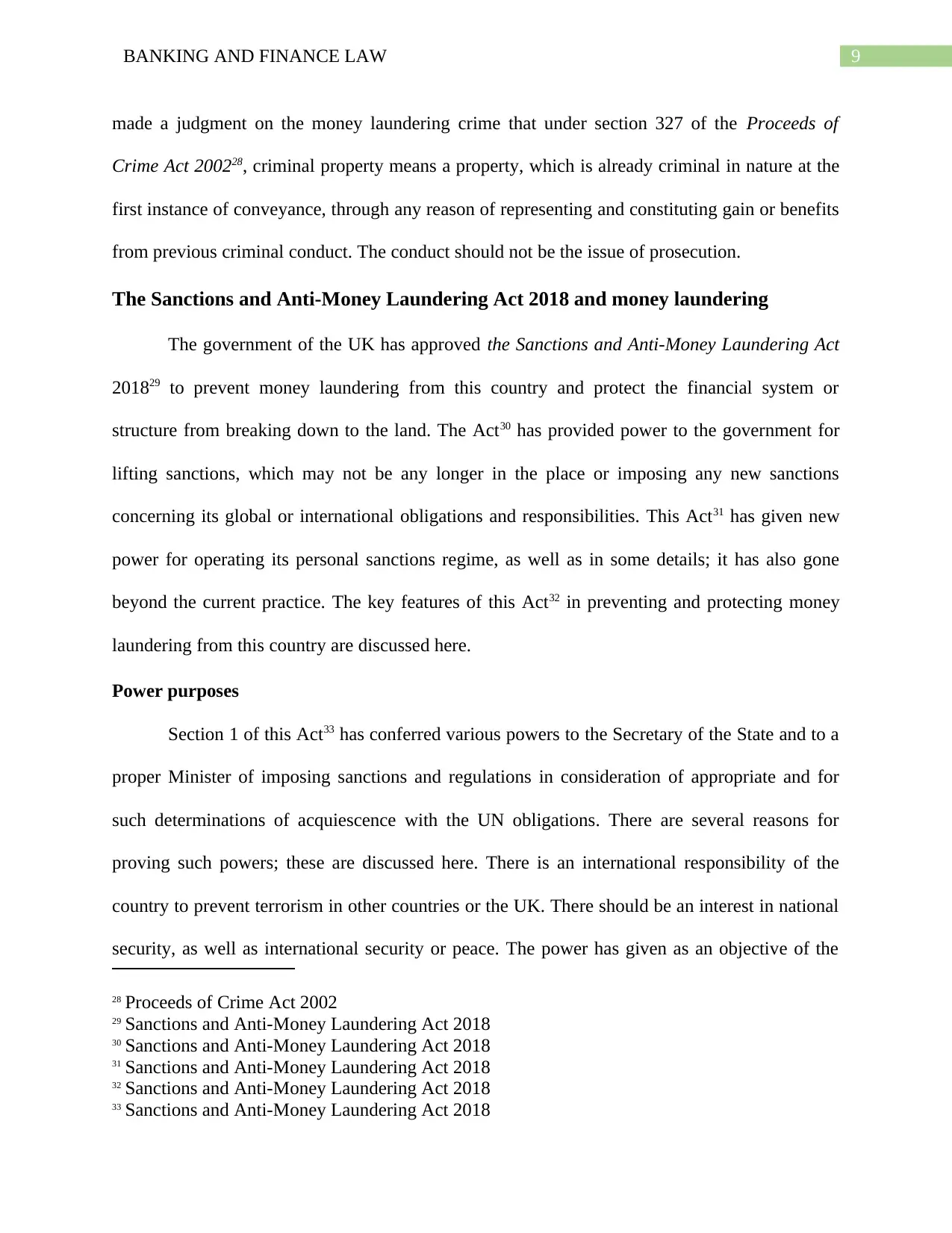
9BANKING AND FINANCE LAW
made a judgment on the money laundering crime that under section 327 of the Proceeds of
Crime Act 200228, criminal property means a property, which is already criminal in nature at the
first instance of conveyance, through any reason of representing and constituting gain or benefits
from previous criminal conduct. The conduct should not be the issue of prosecution.
The Sanctions and Anti-Money Laundering Act 2018 and money laundering
The government of the UK has approved the Sanctions and Anti-Money Laundering Act
201829 to prevent money laundering from this country and protect the financial system or
structure from breaking down to the land. The Act30 has provided power to the government for
lifting sanctions, which may not be any longer in the place or imposing any new sanctions
concerning its global or international obligations and responsibilities. This Act31 has given new
power for operating its personal sanctions regime, as well as in some details; it has also gone
beyond the current practice. The key features of this Act32 in preventing and protecting money
laundering from this country are discussed here.
Power purposes
Section 1 of this Act33 has conferred various powers to the Secretary of the State and to a
proper Minister of imposing sanctions and regulations in consideration of appropriate and for
such determinations of acquiescence with the UN obligations. There are several reasons for
proving such powers; these are discussed here. There is an international responsibility of the
country to prevent terrorism in other countries or the UK. There should be an interest in national
security, as well as international security or peace. The power has given as an objective of the
28 Proceeds of Crime Act 2002
29 Sanctions and Anti-Money Laundering Act 2018
30 Sanctions and Anti-Money Laundering Act 2018
31 Sanctions and Anti-Money Laundering Act 2018
32 Sanctions and Anti-Money Laundering Act 2018
33 Sanctions and Anti-Money Laundering Act 2018
made a judgment on the money laundering crime that under section 327 of the Proceeds of
Crime Act 200228, criminal property means a property, which is already criminal in nature at the
first instance of conveyance, through any reason of representing and constituting gain or benefits
from previous criminal conduct. The conduct should not be the issue of prosecution.
The Sanctions and Anti-Money Laundering Act 2018 and money laundering
The government of the UK has approved the Sanctions and Anti-Money Laundering Act
201829 to prevent money laundering from this country and protect the financial system or
structure from breaking down to the land. The Act30 has provided power to the government for
lifting sanctions, which may not be any longer in the place or imposing any new sanctions
concerning its global or international obligations and responsibilities. This Act31 has given new
power for operating its personal sanctions regime, as well as in some details; it has also gone
beyond the current practice. The key features of this Act32 in preventing and protecting money
laundering from this country are discussed here.
Power purposes
Section 1 of this Act33 has conferred various powers to the Secretary of the State and to a
proper Minister of imposing sanctions and regulations in consideration of appropriate and for
such determinations of acquiescence with the UN obligations. There are several reasons for
proving such powers; these are discussed here. There is an international responsibility of the
country to prevent terrorism in other countries or the UK. There should be an interest in national
security, as well as international security or peace. The power has given as an objective of the
28 Proceeds of Crime Act 2002
29 Sanctions and Anti-Money Laundering Act 2018
30 Sanctions and Anti-Money Laundering Act 2018
31 Sanctions and Anti-Money Laundering Act 2018
32 Sanctions and Anti-Money Laundering Act 2018
33 Sanctions and Anti-Money Laundering Act 2018
Paraphrase This Document
Need a fresh take? Get an instant paraphrase of this document with our AI Paraphraser
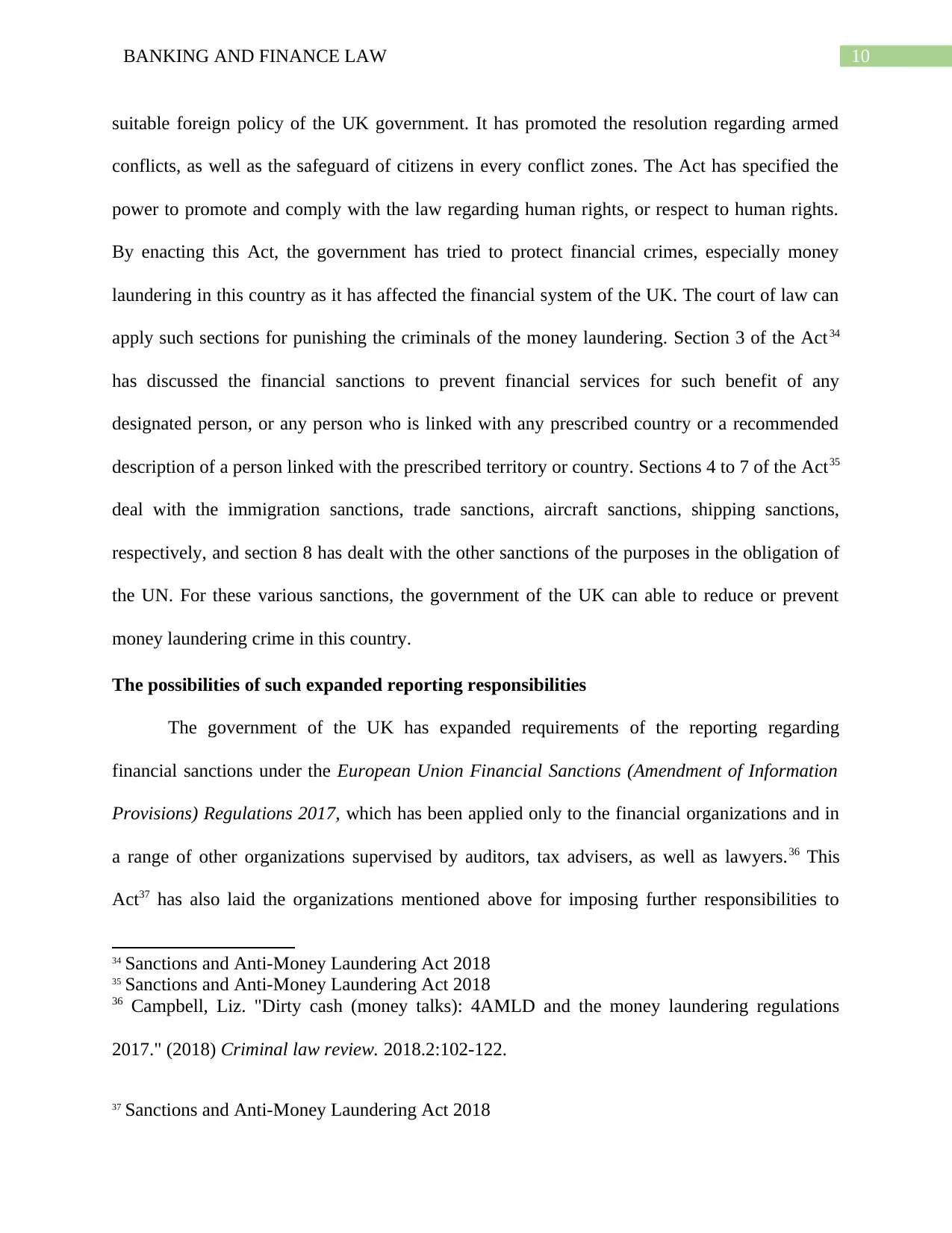
10BANKING AND FINANCE LAW
suitable foreign policy of the UK government. It has promoted the resolution regarding armed
conflicts, as well as the safeguard of citizens in every conflict zones. The Act has specified the
power to promote and comply with the law regarding human rights, or respect to human rights.
By enacting this Act, the government has tried to protect financial crimes, especially money
laundering in this country as it has affected the financial system of the UK. The court of law can
apply such sections for punishing the criminals of the money laundering. Section 3 of the Act34
has discussed the financial sanctions to prevent financial services for such benefit of any
designated person, or any person who is linked with any prescribed country or a recommended
description of a person linked with the prescribed territory or country. Sections 4 to 7 of the Act35
deal with the immigration sanctions, trade sanctions, aircraft sanctions, shipping sanctions,
respectively, and section 8 has dealt with the other sanctions of the purposes in the obligation of
the UN. For these various sanctions, the government of the UK can able to reduce or prevent
money laundering crime in this country.
The possibilities of such expanded reporting responsibilities
The government of the UK has expanded requirements of the reporting regarding
financial sanctions under the European Union Financial Sanctions (Amendment of Information
Provisions) Regulations 2017, which has been applied only to the financial organizations and in
a range of other organizations supervised by auditors, tax advisers, as well as lawyers.36 This
Act37 has also laid the organizations mentioned above for imposing further responsibilities to
34 Sanctions and Anti-Money Laundering Act 2018
35 Sanctions and Anti-Money Laundering Act 2018
36 Campbell, Liz. "Dirty cash (money talks): 4AMLD and the money laundering regulations
2017." (2018) Criminal law review. 2018.2:102-122.
37 Sanctions and Anti-Money Laundering Act 2018
suitable foreign policy of the UK government. It has promoted the resolution regarding armed
conflicts, as well as the safeguard of citizens in every conflict zones. The Act has specified the
power to promote and comply with the law regarding human rights, or respect to human rights.
By enacting this Act, the government has tried to protect financial crimes, especially money
laundering in this country as it has affected the financial system of the UK. The court of law can
apply such sections for punishing the criminals of the money laundering. Section 3 of the Act34
has discussed the financial sanctions to prevent financial services for such benefit of any
designated person, or any person who is linked with any prescribed country or a recommended
description of a person linked with the prescribed territory or country. Sections 4 to 7 of the Act35
deal with the immigration sanctions, trade sanctions, aircraft sanctions, shipping sanctions,
respectively, and section 8 has dealt with the other sanctions of the purposes in the obligation of
the UN. For these various sanctions, the government of the UK can able to reduce or prevent
money laundering crime in this country.
The possibilities of such expanded reporting responsibilities
The government of the UK has expanded requirements of the reporting regarding
financial sanctions under the European Union Financial Sanctions (Amendment of Information
Provisions) Regulations 2017, which has been applied only to the financial organizations and in
a range of other organizations supervised by auditors, tax advisers, as well as lawyers.36 This
Act37 has also laid the organizations mentioned above for imposing further responsibilities to
34 Sanctions and Anti-Money Laundering Act 2018
35 Sanctions and Anti-Money Laundering Act 2018
36 Campbell, Liz. "Dirty cash (money talks): 4AMLD and the money laundering regulations
2017." (2018) Criminal law review. 2018.2:102-122.
37 Sanctions and Anti-Money Laundering Act 2018
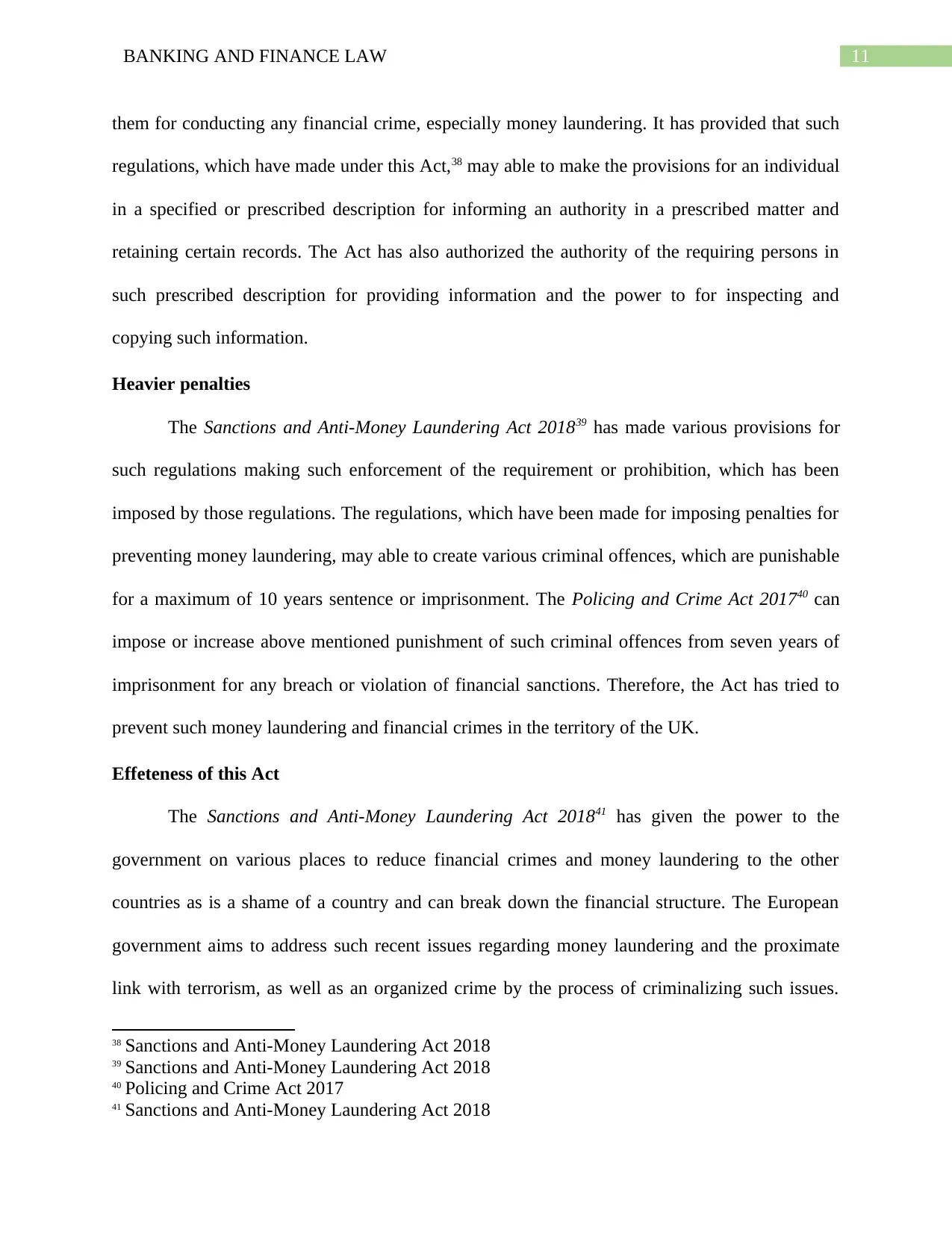
11BANKING AND FINANCE LAW
them for conducting any financial crime, especially money laundering. It has provided that such
regulations, which have made under this Act,38 may able to make the provisions for an individual
in a specified or prescribed description for informing an authority in a prescribed matter and
retaining certain records. The Act has also authorized the authority of the requiring persons in
such prescribed description for providing information and the power to for inspecting and
copying such information.
Heavier penalties
The Sanctions and Anti-Money Laundering Act 201839 has made various provisions for
such regulations making such enforcement of the requirement or prohibition, which has been
imposed by those regulations. The regulations, which have been made for imposing penalties for
preventing money laundering, may able to create various criminal offences, which are punishable
for a maximum of 10 years sentence or imprisonment. The Policing and Crime Act 201740 can
impose or increase above mentioned punishment of such criminal offences from seven years of
imprisonment for any breach or violation of financial sanctions. Therefore, the Act has tried to
prevent such money laundering and financial crimes in the territory of the UK.
Effeteness of this Act
The Sanctions and Anti-Money Laundering Act 201841 has given the power to the
government on various places to reduce financial crimes and money laundering to the other
countries as is a shame of a country and can break down the financial structure. The European
government aims to address such recent issues regarding money laundering and the proximate
link with terrorism, as well as an organized crime by the process of criminalizing such issues.
38 Sanctions and Anti-Money Laundering Act 2018
39 Sanctions and Anti-Money Laundering Act 2018
40 Policing and Crime Act 2017
41 Sanctions and Anti-Money Laundering Act 2018
them for conducting any financial crime, especially money laundering. It has provided that such
regulations, which have made under this Act,38 may able to make the provisions for an individual
in a specified or prescribed description for informing an authority in a prescribed matter and
retaining certain records. The Act has also authorized the authority of the requiring persons in
such prescribed description for providing information and the power to for inspecting and
copying such information.
Heavier penalties
The Sanctions and Anti-Money Laundering Act 201839 has made various provisions for
such regulations making such enforcement of the requirement or prohibition, which has been
imposed by those regulations. The regulations, which have been made for imposing penalties for
preventing money laundering, may able to create various criminal offences, which are punishable
for a maximum of 10 years sentence or imprisonment. The Policing and Crime Act 201740 can
impose or increase above mentioned punishment of such criminal offences from seven years of
imprisonment for any breach or violation of financial sanctions. Therefore, the Act has tried to
prevent such money laundering and financial crimes in the territory of the UK.
Effeteness of this Act
The Sanctions and Anti-Money Laundering Act 201841 has given the power to the
government on various places to reduce financial crimes and money laundering to the other
countries as is a shame of a country and can break down the financial structure. The European
government aims to address such recent issues regarding money laundering and the proximate
link with terrorism, as well as an organized crime by the process of criminalizing such issues.
38 Sanctions and Anti-Money Laundering Act 2018
39 Sanctions and Anti-Money Laundering Act 2018
40 Policing and Crime Act 2017
41 Sanctions and Anti-Money Laundering Act 2018
⊘ This is a preview!⊘
Do you want full access?
Subscribe today to unlock all pages.

Trusted by 1+ million students worldwide
1 out of 19
Related Documents
Your All-in-One AI-Powered Toolkit for Academic Success.
+13062052269
info@desklib.com
Available 24*7 on WhatsApp / Email
![[object Object]](/_next/static/media/star-bottom.7253800d.svg)
Unlock your academic potential
Copyright © 2020–2025 A2Z Services. All Rights Reserved. Developed and managed by ZUCOL.





